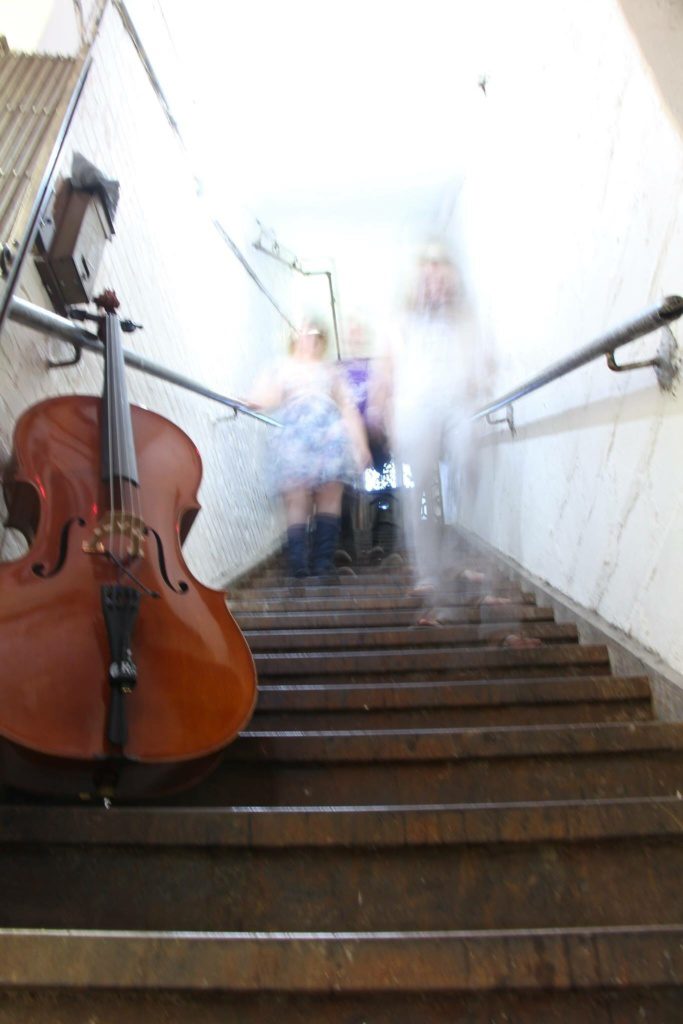
by Veronica DeFeo | Feb 9, 2018 | albums, wolf tracks
Milwaukee-based No No Yeah Okay, an electronic/pop/hip-hop/punk band is dropping their sophomore EP, Cabal, on February 9. Comprised of Mark Gage (producer), Christopher Quasius (guitar), Colin Plant (vocals) and Joshua Paynter (bass), the group, founded in 2014, signed to LA-based indie label Little Assembly last year. No No Yeah Okay came together to combine their music as one group, releasing their debut EP, Dual in 2014. They have already released their single, “Make Believe” and an accompanying music video. You can check it out here. It has been well received, being added to Spotify’s New Music Friday and streamed over 114K times, as the group has been growing in both recognition and popularity.
Kicking off Cabal with “Boulevard”, a synth-filled track that is highlighted with streams of even vocals. “Get Lost” provides more of a soft-punk sound with electronica that is not over-the-top, but perfectly present. “Make Believe” blends soft pop with hip-hop beats, while “That Ain’t You” is an upbeat, catchy track melding tight pop sounds with clear vocals. “What Can I Say” is one of the most hip-hop/electronic of the tracks, combining snappy beats with flowing vocals. Cabal shows No No Yeah Okay as more experienced, synced, and mature.
Connect with No No Yeah Okay here:
Website – Facebook – Twitter

by Madison Blom | Feb 7, 2018 | singles, wolf tracks
Fueled by their passion for music, Everett Bird – an emerging Montreal-based trio – is preparing to release their debut album this month. Through clever and catchy song writing, Everett Bird is able to convey relevant and relatable content with twangy hooks that rings similar to popular 90’s hits. Written in an old Montreal apartment, their first full length album was written with the help of band members Mikey Arcidiacono and Liam. Together, their music heavily reflects the popular sounds and vibes of their hometown and is deeply rooted in the indie rock genre.
Though this album is their first to release to the public since signing on with Royal Mountain Records, they have not been shy when it comes to performing around Canada. These three have performed in some of the hottest cities, such as Vancouver and Montreal, which has brought them a significant fan group eagerly awaiting the release of their album on February 23rd.
The hook to this band is found in their wide variety of incorporated styles. They have written music that dabbles in not only traditional indie rock, but also music with noticeable jazz, R&B and punk undertones. Their song, “Bucket of Dark Meat,” which is included in the album, has already been released to preview – so grab some dark meat and tune into Everett Bird’s new release, “Bucket of Dark Meat!”
Keep up with Everett Bird here.

by Abby Trapp | Feb 6, 2018 | singles, wolf tracks
Oakland natives The Minnesota Child just released their new single “Stay With Me” off of their new EP “Fireflies.” Proclaimed as an indie folk group, the single “Stay With Me” touches on heartbreak and love. Atwood Magazine describes the single as “…some sort of musical magic, ‘Stay with Me’ is a love song, a song of struggle, and a song of acceptance: From the heart, to the heart.”
When I listened to “Stay With Me” I was surprised as the song made me feel calm and tranquil while the background of the guitar and banjo evens the song out. It is definitely a song that would pop up in a local coffee shop or a Nicholas Sparks movie…and I mean that in the sweetest, simplest way.
To hear more of The Minnesota Child visit http://theminnesotachild.com

by Madison Blom | Feb 2, 2018 | singles, wolf tracks
After releasing their single “Chorus”, front man Nate Cardaci of Literature decided that he would assemble a band that would act as an outlet for songs of a similar vibe. This is what brought about the birth of one of the newest groups to enter the indie-dream pop scene. Along with several other members from the original Literature group such as Steven Garcia and Seth Whaland as well as recruiting new friends such as synth player Ian Jensen. With this new lineup the newly formed Très Oui was able to show the music world what they had to offer.
Even though the full album Poised to Flourish will not be released until February 9, 2018, their single “Red Wine & Dry Ice” already has fans on the edge of their seats with anticipation. Not only have they used Jensen’s synth skills to create a unique sound, but they have also incorporated lots of jangy guitar loops that has strong 80’s overtones and beach-worthy vibes. In the words of the group, “We want the songs to be in your head, but we don’t want to force our way in there. More of a hug than a handshake.” This young, new group has emerged and is hitting the music scene with energy and excitement that is worth keeping an eye on.
Keep up with Très Oui here.

by Meredith Schneider | Jan 9, 2018 | singles, wolf tracks
This week, indie rock/bedroom pop musician Soccer Mommy announced that her debut album – titled Clean – is expected to drop on March 2nd. While we wait ever-so-patiently for what is to be one of this year’s most spectacular releases, here’s a fun addition to her catalog… the official music video for her track “Your Dog”. Feisty and in-your-face, the first line of the song is “I don’t want to be your fucking dog.” While we watch a series of sensitive, beautifully portrayed, and oftentimes comical scenes involving twenty-year-old Sophie Allison herself, we’re distracted enough to forget that this song is about freedom.
Admits Sophie about the track:
The song comes from a feeling of being paralyzed in a relationship to the point where you feel like you are a pawn in someone else’s world. The song and the video are meant to show someone breaking away and taking action, but at the same time, it’s only a quick burst of motivation. It’s a moment of strength amidst a long period of weakness.
Keep up with Soccer Mommy here.

by Meredith Schneider | Dec 18, 2017 | wolf tracks
New Jersey-based indie psych rock band Speed The Plough – comprised of John, Toni and Mike Baumgartner and Ed Seifert, joined by former STP bassist Dan Francia and drummer Ken Meyer – released their latest full length on December 8th. The album, titled …And Then, is comprised of ten tracks that dare to drag you into a soundscape that doesn’t altogether make sense in one grouping. From one track to the next, the group displays their musical prowess and keeps the listener on their toes with the variety of sounds they are able to create together.
Take “Crossing the Tizsa” for example. The lyrics are almost like a fairy tale or a beautiful children’s story, set over dark instrumentals that eventually lighten into a Renaissance-like tranquility. This makes sense, as it was found in a songbook of Hungarian folk songs. (John’s mom is the one who can be heard in the spoken word section, by the way. Props to her!) “Take Me” allows the album to take on a whole different persona, introducing itself with bass that would rival the best oughts’ pop/punk tracks. And while “Azimuth” has an unmistakable 70s vibe, perhaps driven by the keys that make up the melody, “The Bitter End” feels abrupt and intense in its disposition. By the time we reach fifth track “Marina”, we’re not sure what to expect, as Speed The Plough tends to switch up the sound on us from one track to the next. For example, “Marina” brings back that beautiful renaissance-meets-rock feel to it, almost as though it should be on an A/B Side with “Crossing the Tizsa”.
“By This River” is light as a feather, largely driven by simple and delicate piano chords. Its sound is slightly different from its predecessors as well, if not only for the fact that it is a cover originally done by Brian Eno. While we might expect “Why We Fall in Love” to be some sort of intense love ballad, it’s more of a quirky indie track with percussion that feels primal, and perhaps groups it back in that “far-off places, daring sword fights, magic spells” territory. (Guess that reference in the comments and you’ve got a new bets friend!) “The Bird Has Flown” is almost theatrical in its presence, notable for its robust piano chords and delicate guitar.
Last two tracks “Running On” and “Dark Continents” happen to have been originals from an earlier iteration of the band called The Trypes. These tracks hadn’t gotten the studio attention the band thought they needed to thrive, so these tracks happen to have a different, low-key, “vibing out” feel to them that really tends to invigorate as the last track fades out beautifully.
…And Then is available now. Keep up with Speed The Plough here.

by Meredith Schneider | Nov 22, 2017 | 5 to 7
Relatively new to the scene, rock trio
Invisible Candy – comprised of Jen Smith (cello), Carter Zumtobel (drums), and Colin Campbell (guitar/lead vocals) – often refer to themselves as “Brooklyn’s chamber rock sweethearts,” but might just be on their way to having the world believe them. The fact that a rock trio features a cello prominently is already alluring enough. Take three distinctive performers who proudly proclaim their newfound love for “flowers, German expressionism, fake blood, and obviously candy,” add the frenetic, romanticized sound that steadily flows from the speakers, and you’ve got genre-bending rock that encapsulates chamberpunk ditties like “Mental Hatchets” alongside sweeping indie rock tunes like “Simone”.
In honor of their latest single we got a few minutes to learn more about the band behind that intense, enigmatic sound.
What is the Invisible Candy conception story?
Jen Smith: We’re not a concept band, but I could see us going in that direction. We have divergent influences from the past that we could weave into a modern sound and build a narrative around that process … that’s the dream, right? But as of now, the origin story is three people met through mutual friends and started making music together. The name literally came out of a dream and since inception we’ve been challenging ourselves to write more freely … more psych, more garage rock, more experimental.
Colin Campbell: We’ve all been in bands that had several more cats to herd at once. So a trio, at least as the constant core to then ornament, was immediately appealing.
Carter Zumtobel: 
With your collection of bold personalities, what is the writing process like? Does it vary from song to song? Take us inside your process!
JS: Well, this EP we’re working on is somewhat “soaked” subject matter – heavy, drunk, woeful. Even though our original batch of songs is from Colin’s notebook, Carter brings a new element with the drums and we have to work as a collective to find what the cello will add. Nothing is set in stone. We revisit a lot of songs on a structural level just to see what happens. And it’s usually a fun jaunt, not at all a confrontational or frustrating process. We will have some new material soon too, and that might come from Carter’s writing and my arrangement or Colin on lead guitar and me on keys or any number of combinations. We’re all about the possibilities right now.
CC: I generally use simple pop structures with lyrical references from an otherwise useless liberal arts background. Part of me always wants to coax audiences into something sweet and entertaining, almost saccharine, then twist it with something a tad more sonically or lyrically demanding.
Your latest track “Mental Hatchets” is so, so good. Do you mind discussing the inspiration?
CC: It’s of course an unironic bullet-pointed list of why we’re living in a globalized urban utopia!
With so much good music being released right now – especially since a certain event last year – we’re falling over ourselves trying to keep up with it all! It makes me wonder, is there pressure with an up-and-coming band to have a message or stance with everything?
JS: For me, it’s important to have a stance and to have integrity, on stage and off. I’ve seen lots of bands lend their talents to benefit shows, and we are participating in that movement too. We’re donating a set to Thursdays for a Cause at Our Wicked Lady in Brooklyn on 12/14, for example. That’s something we’d like to do regularly, as well as put our resources behind artists from marginalized communities.
As artists, we’ve looked to the past for inspiration, like the antifascist movement Rock Against Racism, to see how musicians felt and dealt with such troubled times historically. And I think off stage, we’ve all taken steps to educate ourselves on structural oppression and we talk to each other pretty freely. The openness and acceptance in this band definitely helps me effect changes in my non-performer life.
If you could be a superhero, who would you be, and why?

JS: Superman, because I am a masochist and I want to know what it’s like to control your otherworldly strength in every human gesture, thereby taking notice of every delicate and unbearable human gesture.

CC: Professor Xavier because he does his ass-kicking under a cozy blanket on a levitating barcalounger.

CZ: Rod Kimble, stuntman extraordinaire.
BIGGER question… if “Mental Hatchets” were part of a Thanksgiving meal, what part would it be and why?
JS: I think cranberry sauce cause it’s a small portion with a lot of zing!
CC: The stuffing, just cause it’s all I can think about right now.
CZ: Keep on rocking in the free world.
___
Catch Invisible Candy at Gold Sounds Bar in Brooklyn on November 29th. Keep up with the band
here.

by Meredith Schneider | Nov 21, 2017 | wolf tracks
Earlier this month, Kentucky-based alternative/indie group Father Mountain – comprised of Travis Cox, Jesse French, Austin Hohiemer, and Zane Martin – released ten track full-length debut Apartment Living. With that title alone, I don’t know a single person who wouldn’t be intrigued to find out if there are shared experiences in the plane of living in actual apartments. Of course, we expected topics to bounce around a little more than that. What we didn’t expect was that the album would make us feel so good.
With vocals laced so thickly with sincerity, Father Mountain completely pulls you into the emotions of every song. “Grey” teaches us not to assume too much about the mood of the track based on its title, while “Sobriety” saunters along in a melancholic sound space. (Slightly as expected.) “Friends” picks up with more of an alt-pop vibe, something that distracts from the self-assessing narrative about the importance of timing and friendship – or otherwise – hitting you when you least expect it. “Grace” exists at just over one minute, discussing the struggle of decision making in relationships, and giving us a line with the word “grey” that feels much more melancholic than the first track. “Hallelujah” has a very distinct Death Cab For Cutie feel to it, winding a narrative about angels and the afterlife, really packing in the religious verbiage and allowing those who attended private school a bit of a leg up when deciphering it.
Keep up with Father Mountain here.

by Meredith Schneider | Nov 10, 2017 | wolf tracks
Indie alternative pop collective Fond of Rudy recently released their latest single “To Be Mine”, a head-boppin’ pop love song that will get you feeling upbeat and positive in no time. With instrumentals that maintain their modern flare while nodding electronic influence to the 80s, the chorus has that sound that just makes you feel free. Almost as though the instrumentals are pounding out of your chest. And the sweet as sugar lyrics don’t hurt the effect, if we’re being completely honest.
Keep up with Fond Of Rudy here.













